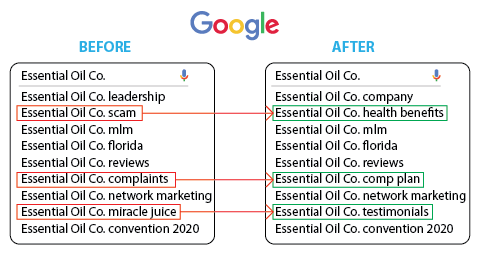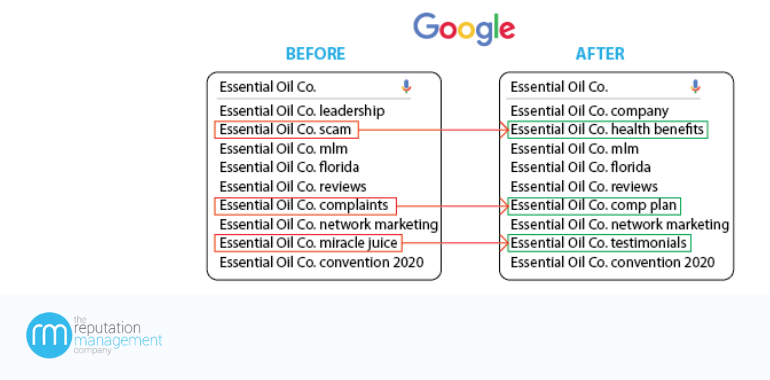An Introduction To Search Engine Reputation Management (SERM)
The term ‘Search Engine Reputation Management’ describes the methods used to control or influence a brand or company’s public image. The World Economic Forum reports that a company’s reputation accounts for a quarter of its’ market value. The traditional term for this practice is Public Relations (PR), however as more companies move online, search results have become a vital element of any brand’s reputation. Online Reputation Management (ORM) encompasses Search Engine Reputation Management (SERM).

According to Digital Squad, up to ninety-two percent of prospective customers and employees will research your company online, before contacting you. Your reputation on the Internet is determined by what these people find when they type the name of your company into Google. Sadly, in many cases, one thing they are sure to see is negative comments. In the online era, anybody can express an opinion. It is incredibly easy to tell the world what you think about a company’s services or products. If somebody harbors a grudge against your brand, they can relay this to a large audience – simply by typing a couple of paragraphs. Any aggrieved customer can give your company a scornful review, by writing blog posts or publishing social media content that paints you in a bad light. This occurs because it is human nature to highlight negative experiences more frequently than positive ones. It might be that your company deserves a poor review, but equally, you could be on the receiving end of dirty tactics from rival companies. Numerous careers and lives have been ruined by Google’s search results because the general public regards the algorithm it uses to be independent and governed by impartial criteria.
Of course, the results displayed by search engines are just one element of online reputation. Internet forums, social media accounts, and review websites are all additional resources that can affect the way your brand is perceived. For this reason, it is important to monitor these platforms closely. Not keeping abreast of your virtual footprint is foolhardy, because it could be fatal to your brand. ORM involves developing and/or improving an online presence, to ensure that you come across well to prospective customers. Essentially, this is all about highlighting neutral and positive information about your company and minimizing negative information. If you follow the correct strategies, you can safeguard your public image and raise awareness of your brand.
Introduction to Search Engine Reputation Management (SERM)
This introduction to Search Engine Reputation Management (SERM) will cover how to constantly monitor and influence the public’s impression of your company online. The main goal of SERM is to counteract negative comments and search engine results on the web. SERM encompasses paid search marketing, search engine optimization, blogging, social media, and press optimization.
To keep your reputation intact, you must first understand how to track it. In other words, you have to know what people have said about your company. Then, you can deal with any negative feedback straight after it is published. If you do not monitor the public perception of your brand, you will be unable to prevent the spread of harmful content online.
It is good practice to set up alerts for your product names, key staff members, and brand names. The Google Alerts service notifies you, whenever these names appear on normal web pages. Typically, it is faster to spot problems on social media, although Google does not currently provide a service for this. Social Mention is an example of a free service, which you can use to track different social media platforms. This way, issues can be addressed before they appear on standard websites, which might rank for your brand name in the search results. As well as helping you to manage your reputation, these services can help you spy on your competitors, or keep you informed about emerging trends in your industry. It never hurts to know how your competitors are perceived by the general public.
It is important to monitor your reputation across numerous keywords and channels. Damaging information might be published as images, podcasts or video reviews — so be sure to check and fix these as well. Larger brands have dozens of keywords that appear countless times per day online. They use costly software and skillful keyword research, to promptly identify the negative comments that require attention. Fast reactions and a backup plan are also required, to rapidly deal with harmful content.
Arguably, the most significant element of reputation management online is social media. You should set up company accounts on all the platforms related to your industry. You could begin with LinkedIn, Facebook, and Twitter. Nonetheless, just having the accounts is insufficient – You have to be active on them to grow and sustain an interested audience. Make update announcements, engage with people’s comments, and reply to anyone who contacts you. This is a great method to connect with your target demographic. On social media, you can gain the trust of your followers, which reduces the likelihood of anyone making a negative comment about your company. If you receive any complaints, you can message people quickly to resolve the issues. Another advantage of posting frequently on social media is that it gives your brand greater authority with the search engines. You might wish to use specific hashtags on these platforms, which your followers can tag their content with. The more activity your social media account has, the bigger the chance that it will rank highly for your company name.
If some of your customers have given negative feedback about your company, one method to stop them from damaging your reputation is to divert attention away from it. This can be done by occupying all the search results for your company on the first page of Google. To do this, you will have to regularly publish fresh content about your brand: testimonials and reviews, guest posts, press coverage, and more. Also, you could contribute to related publications. After you have claimed the first ten results in Google, it will be difficult for negative comments to get seen, so people who search for your company online are unlikely to notice them.
Needless to say, all the content you produce to rank highly on Google should be positive. You want the search engines to associate your brand and products with uplifting experiences, so that relevant (i.e. positive) websites are displayed prominently. Furthermore, this type of content boosts your company’s reputation and raises awareness. Show people that you are a credible industry player, by publicly naming your partners. Ask your satisfied customers to document their experiences on Youtube or other review platforms, because Google tends to rank these websites highly.
You are unlikely to generate many sales if you try to rank for technical terms that your customers don’t use. Instead, it is best to publish insightful articles about new projects that will interest people in your sector. This will attract business partners, press coverage, and job applicants — all of which strengthen your brand in the eyes of prospective customers.
Most online forums and communities permit companies to reply to customer feedback. These websites offer you a good chance to reach out to unhappy customers, address their issues wherever possible, and change their opinion. Tell them that you appreciate their concerns and regret that they had a bad experience. This can be an effective way to repair relationships with dissatisfied customers. Everyone makes mistakes, and people know that you won’t get everything right all the time. Nonetheless, the mistakes themselves are less important than the way you deal with them. Receiving a legitimate complaint from a customer about your service or product is not necessarily a bad outcome. They might provide you with valuable feedback that will help to improve your company. Take action to resolve the complaint and learn lessons from it. Even with customers who have complained before, the way you respond can motivate them to adopt a more positive view of your brand. You want them to regard your company as one that is accountable for its’ actions.
If someone has made unfair comments about your company on a review website, the most sensible course of action is to request that the user amends or removes the comments. By doing this, you will rectify the situation in an amicable way. Regrettably, there are circumstances when it is impossible to reach an amicable solution, but this approach does work some of the time. Review websites and consumer platforms can make or break you. If do not monitor the opinions expressed on these forums regularly, your brand might suffer irreparable harm.
Protecting your reputation online is not straightforward. You have to be vigilant and constantly aware of what people are saying about your company. You have to deal with aggrieved customers tactfully, and optimize the Google search results to the best of your ability. The above introduction to Search Engine Reputation Management (SERM) will allow you to establish a solid online presence. This way, people who search for your brand will be happy to give you their customs. A good reputation leads to good sales figures, so get out there and make it happen.




